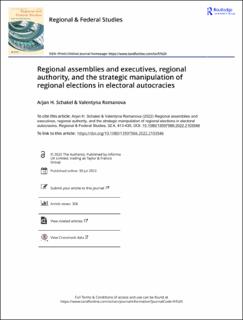Regional assemblies and executives, regional authority, and the strategic manipulation of regional elections in electoral autocracies
Journal article, Peer reviewed
Published version

View/
Date
2022Metadata
Show full item recordCollections
Abstract
In this introduction, we set out to analyse the relationship between regional elections and regional authority and the extent to which regional elections are held free and fair. We hypothesize that the incentives to interfere increase when regions exercise more authority but the possibilities to interfere decline when the regional executive is elected. A quantitative analysis confirms that directly elected and stronger regional bodies make them more attractive for central meddling, but the presence of elected executives makes central interference less likely. We zoom-in on nine electoral autocracies that have featured in the past five annual reviews of regional elections to explore how regional elections become less free and fair. We identify six strategies to manipulate regional elections which are applied in at least two electoral autocracies: simultaneity between regional and national elections, limiting party entry, gerrymandering, nationalizing regional election campaigns, party switching, and centralization of authority.
